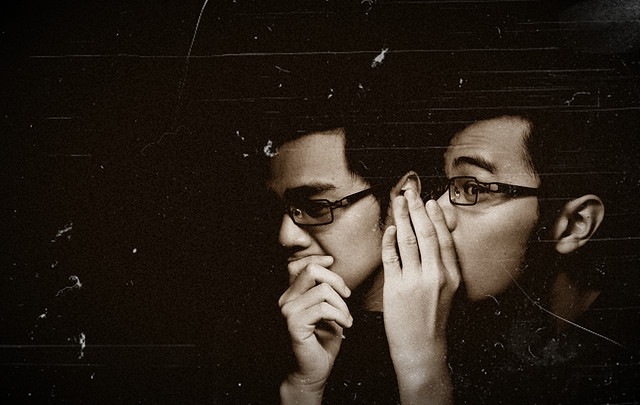John Larkin | Contributing Writer
View the Arts Block on any given day and you’ll see this common sight unfold. An audience of perhaps three to five, is enraptured around a dramatic storyteller, with evident anticipation in their eyes. Half a minute later, the group has descended into breathless laughter or shocked gasps. Another piece of gossip has just been shared.
Worryingly, this is often seen as harmless fun, even in its most pernicious forms. People have become veritable routers of private information, relaying stories to friends with glee and aplomb.
The problem seems to be that the gossip of strangers, or those outside our immediate friend group, are considered fair game. A friend who discusses something intimate with you (or anything that could be considered good gossip) would be rightly horrified if you then shared it with the world. But if you pass on information about someone you both know distantly, or a person you dislike, this generally escapes scrutiny.
Consider when you last heard someone say, ‘Should you be telling that story?’ Or, ‘Don’t say that’ about a stranger or an enemy.
What’s worrying is that such questions are almost never asked. I can recall only one occasion when a highly ethical person called me out on this. I was taken aback, but I had to accept the rebuke. Other unexamined topics include ‘How do we really know the story is true and even if it is, what kind of damage are we doing to the subject by repeating it?’
A culture that accepts gossip is clearly not conducive to forming healthy, trusting relationships.
The neuroscientist Sam Harris has described trying to rebut a vicious untruth as like trying to fight the laws of entropy themselves: whereas the victim must seek out everyone who has heard it and explain the truth of the matter, the teller can simply sow the seed of a lie and watch others spread it for them.
A study in The Journal of Personality and Social Psychology found that 38% of all encounters between college students contains lies. In light of facts like these, there is an obligation for us to be more ethical about how we communicate with one another.
The concerns of malicious gossip are not just altruistic ones. There are good self-interested reasons not to be a gossip merchant.
If someone tells me a particular interesting, juicy and damning piece of gossip, I would obviously be entertained. At the back of my mind though, questions are arising, and an alarm has been set off.
‘Would this person gossip about me?’
‘Can I trust them?’
‘What won’t they say?’
This is clearly not conducive to healthy, trusting relationships.
I do not think I’m out of the ordinary in having these fears. What is out of the ordinary is the hypocrisy with which we ask them while peddling gossip ourselves.
True or untrue, would I want this story told about me? And what does it say about me that I want to tell it?
It’s even become common to bond over gossip. Consider it: lets become friends over the retelling of stories that disregard people’s privacy, embarrassing mistakes or attempts at changing for the better.
Finally, we’ve all seen gossip as a way of venting of frustration, or as it’s colloquially known, “bitching”. Rather than directly attempt to correct a problem we have with someone, we complain and damn them to sympathetic listeners. Whether such frustrations are a cry for help, or simply a sign of passive aggression, they are still unhelpful for promoting honest and open relationships.
I want to be clear on my argument here: I am not criticizing the kind of mindless but hilarious banter we see on nights out, the type that is easily forgotten or reflected on in eventual nostalgia. I’m talking about vicious, character destroying gossip that undermines important things in life, such as relationships, sex, and mental health.
Anthropologists have theorized that gossip serves a social function of informing the listener about the lines of good and bad social conduct. I can frankly think of better ways to do this than potentially ruining someone’s reputation. The theory rings hollow when the gossip has been relayed purely for the sake of entertainment, because the listeners already knew that the offending act was wrong.
I do buy that gossiping is in our nature, and freely admit that I have been as guilty as anyone on the subject. But like with any negative character trait, we must recognize its danger and limit its influence if we are to bring out the best in ourselves.
In conclusion, perhaps we should ask a simple question of ourselves before indulging in gossip:
‘True or untrue, would I want this story told about me? And what does it say about me that I want to tell it?’







